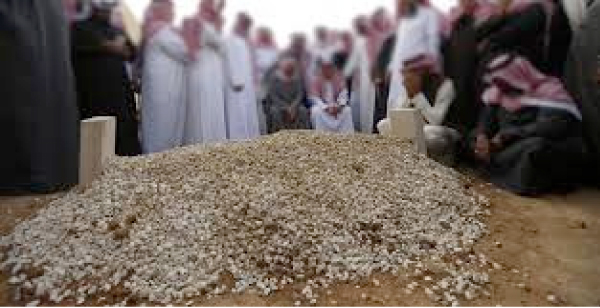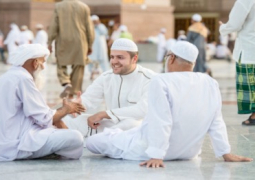
The Sunnah is to raise the grave at least one hand above the ground so it is known that it is a grave. It is forbidden to raise it more than that. This is based on a narrative reported by Muslim and others from Harun that Thamamah ibn Shufayy told him: “Once we were with Fadalah bin ‘Ubayd in the Roman land of Brudis. One of our companions died and upon burying him we were ordered by Fudalah ibn ‘Ubayd to level his grave.
Then Fudalah said: ‘I heard Allah’s Messenger, peace be upon him, ordering people to level the graves of the deceased.” It is reported from Abul al-Hayaj al-Asadi who said ‘Ali bin Abu Talib told me: “Should I not instruct you to do as the Messenger of Allah, peace be upon him, instructed me? Do not leave a statue standing without removing it. Do not leave a grave raised without leveling it.” Tirmizhi said: “Some scholars act upon this opinion. They disapprove of raising the grave more than necessary to indicate that it is a grave, and so people will not step or sit on it.” Muslim governors used to destroy cemetery structures not permitted by the law, in accordance with the authentic sunnah. Ash-Shafi’i said: “I prefer that the soil used for a grave be no more than that dug for that grave. I like to see a grave raised above the ground the length of a hand or so. I prefer not to erect a structure over a grave or to whitewash it, for indeed this resembles decoration and vanity, and death is not the time for either of these things. I have never seen the graves of the Muhajirin or Ansar plastered. I have seen the Muslim authorities destroying structures in graveyards, and I have not seen any jurists object to this.” Ash-Shawkani said: “It is apparent that raising graves more than what is legally permitted is forbidden.
The followers of Ahmad, a group of the followers of Ash-Shafi’i, and Malik are of this opinion. An opinion that raised graves are not prohibited because this practice occurred during the time of the first and later generations without disapproval, which is the position of Imam Yahya and Mahdi in al-Ghayth, is not correct. This argument is based only on their silence about the practice, and silence is not proof when a matter rests on mere assumption, for prohibition of raising graves is presumptive.” Included in the discussion of raising the grave are dome buildings, shrines built on graves, and erecting mosques around graves.
The Prophet, peace be upon him, cursed those who did that. The practice of erecting buildings around graves and beautifying them causes corruption, which Islam seeks to eliminate. Part of such a corruption is exaggerating the importance of graves, in accordance with the superstitious belief of the ignorant, similar to the belief of non-believers in their idols, that these monuments can bring benefit or prevent harm. Thus they travel to these graves for fulfillment of their needs or achievement of their goals. They ask those in the graves what believers should ask only of their Lord. They ride horses to them, touch them, and seek their aid. In general, they do exactly what the pre-Islamic people used to do with their idols.
Despite this disgraceful, reprehensible evil and hideous disbelief, how many people dare to take a stand for the cause of Allah, or evince any uneasiness for the defense of the true din? Where are the scholars and students, and the rulers, the ministers, and the kings, who are obliged to teach the truth? Various reports reaching us leave little doubt that many of these grave adorers, in fact most of them, when confronted and asked under oath to reject such idolatry would readily take a solemn oath falsely by Allah. But if you then ask them, “(Swear) by your spiritual leader and your saint, so-and-so,” they will ponder, apologize, refuse, and confess the truth. This is one of the clearest proofs that their polytheism is indeed worse than that of the Christians and others who say: “Allah, the Exalted, is the second of two or the third of three.” O scholars of Islam! O kings of Islam! What calamity to Islam is worse than disbelief? What tribulation for this religion is worse than worshipping others than Allah? What misfortune for Muslims can equal this misfortune? Is there any more serious abomination than this open polytheism? You might be heard if you called the living, But there is no life in him whom you call; Had there been a fire in which you blew, there would have been light; but you blew in the sand. The scholars have issued clear legal verdicts concerning the destruction of mosques and domes built in cemeteries.
Ibn Hajar said in his az-Zawajir: (This is a collection of legal verdicts, pubhshed when king Al-Zahir decided to destroy all the buildings in the graveyards. Coeval Islamic scholars collectively supported him saying to do so was incumbent upon the ruler.) “We should not hesitate to destroy mosques and domes built over graves. These are worse than the mosque of ad-Dirar, because these things are erected in disobedience to the Messenger of Allah, peace be upon him. The Prophet, peace be upon him, has forbidden this and has ordered the destruction of raised graves. Every lamp or lantern placed over a grave must be removed. It is not correct to stop at a grave or make a vow at it.
Making Humps over Graves and Flattening Them
Jurists agree that it is permissible either to make a little hump over the grave or to flatten it. At-Tabari said: “I dislike it for a grave to be prepared in any way other than these two: it should be either leveled with the ground or raised with a hump over it, but no higher than one hand, as is the common practice among Muslims. Leveling the grave differs from flattening it completely. Jurists differ concerning which of these two methods is best. Al-Qadi ‘Iyad has reported from the major scholars that it is best to make a hump over the grave because Sufyan an-Nammar told him that he had seen the grave of the Prophet, peace be upon him, with a hump over it.” (Bukhari) This is the opinion of Abu Hanifah, Malik, Ahmad, al-Mazani, and many scholars of the Shafi’i school. Ash-Shafi’i’s opinion, however, is that because of the order of the Prophet, peace be upon him, leveling is best.
A: Placing a Distinguishing Mark on a Grave
It is permissible to place a mark, such as a stone or a piece of wood, over a grave so that it can be recognized. This is based on a hadith reported by Ibn Majah from Anas that the Prophet, peace be upon him, “placed a rock over ‘Uthman ibn Maz’eun’s grave so that it could be recognized.” In az-Zawa’id it is stated that its chain of narrators is sound. Abu Daw’ud reported it in the hadith of al-Muttalib ibn Abi Wada’ah which has the following words: “He carried a rock and placed it by the head side of the grave and said, ‘I want to mark my brother’s grave and then bury beside it whoever else of my family dies.”’ This hadith indicates that it is preferable for relatives of the deceased to be buried in adjacent spots because it makes it easier for those who visit their graves to pray for them.
B: Taking Off Shoes in Cemeteries
Most scholars are of the opinion that it is permissible to wear shoes in a cemetery. Jarir ibn Hazim said: “I saw al-Hasan and Ibn Sirin walking with their shoes on in a cemetery.” Anas reported: “The Prophet, peace be upon him, said: ‘When a servant of Allah is put into a grave and his companions leave, he can hear the sound of their sandals’.’’ (Reported by Bukhari, Muslim. Abu Daw’ud, and Nasa’i) The scholars deduce from this hadith that it is permissible to walk in a cemetery with one’s shoes on since the only way the dead would hear the sound of their sandals is when they were wearing them. Ahmad disliked, however, wearing dyed shoes (Sibtiyah (Arabic), a type of shoes dyed with pods of a species of sant tree) in graveyards. This is based on a report by Abu Daw’ud, Nasa’i, and Ibn Majah from Bushair, the freed slave of the Prophet, peace be upon him, who said: “Once the Prophet, peace be upon him, noticed a man wearing shoes while walking in the cemetery. He said to him: ‘O you who are wearing the “Sihtiyyah” (shoes). Woe to you. Take off your “sibtivyah” shoes.’ When the man recognized the Messenger of Allah, peace be upon him, he took them off and threw them away.” Al-Khattabi said: “The order of the Prophet, peace be upon him, may indicate that he disliked this because of the people involved in them. The (sibtiyvah) shoes were worn by privileged people given to luxury. The Prophet, peace be upon him, liked those visiting the graveyards to be humble and unpretentious. Ahmad holds that wearing shoes is disliked only when done without any valid excuse. If there is a genuine reason for wearing shoes, such as, thorns or impurities, then one may keep one’s shoes on.
TO BE CONTINUED


